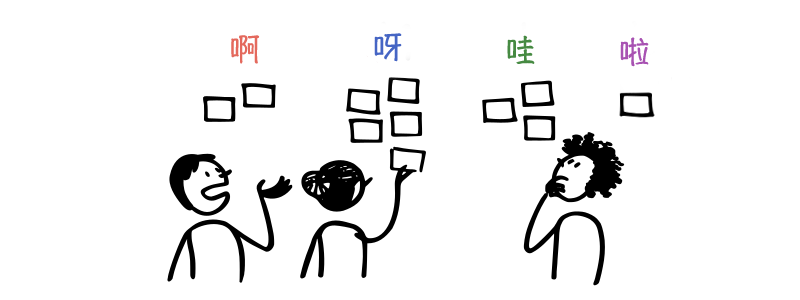Final Particles in Mandarin Chinese is a nightmare for most Chinese learners. In this article, we will be learning about five final particles: 啊 a, 呀 ya, 哇 wa, 哪 na, and 啦 la. However, in reality, they are just variations of the same particle.”
Just in case, I provide an audio file to help you know how we change intonations without changing any tones. Please make sure you’ve read the entire article before you listen to the file.
啊 a
To express exclamation
It shows the tone of exclamation, excitement, surprisement or enthusiasm, etc.
你是日本人啊!你是日本人啊!
You are Japanese! (I am surprised that you are Japanese.)
你也喜歡貓啊!你也喜欢猫啊!
You also like cats! (I am so excited that you also like cats!)
To express certainty, obviousness or urgency
我很忙,所以不能去啊我很忙,所以不能去啊
I was busy, so I couldn’t go. (obviousness)
是啊,是我說的啊!是啊,是我说的啊!
Yes! That’s what I said! (both certainty)
快說啊!快说啊!
Tell me! (urgency)
To use in a question indicated a sense of urgency, impatience, annoyance, or concern for the listener.
你去不去啊?你去不去啊?
You are going or not? (annoyance)
你想說什麼啊?你想说什么啊?
What do you want to say? (impatient)
啦 la
啦 la is the combination of new situation 了 le and 啊 a
你不愛他啦!你不爱他啦!
You don’t love him anymore!?
你要走啦?你要走啦?
Are you going now?
呀 ya, 哇 wa, and 哪 na
Now, let’s talk about the last three final particles: 呀 ya, 哇 wa, and 哪 na. They are actually sharing the meaning as 啊 a, and serve as linking sounds between 啊 an and the preceding character.
| When the word before 啊 a is | + 啊 a | = Linking sounds | Examples |
| -i, -ü, -a, -e, -o * | + 啊 a | = 呀 ya | duì + a = duì ya |
| -u, -ao | + 啊 a | = 哇 wa | hǎo + a = hǎo wa |
| -n | + 啊 a | = 哪 na | tiān + a = tiān na |
| The others | + 啊 a | = 啊 a | zǒu + a = zǒu a |
Note 1: The words ‘zhi’, ‘chi’, ‘shi’, ‘ri’, ‘zi’, ‘ci’, ‘si’, ‘ji’, ‘qi’ and ‘xi’ do not actually have a distinct ‘i’ sound, so it does not affect the pronunciation of the 啊 a sound. For example, in the phrases ‘shì a’ and ‘jī a’, we simply maintain the sound of 啊 a.
Note 2: When writing the linking sounds, you can choose to use either the original character 啊 a, or the sound-changing characters 呀 ya, 哇 wa, and 哪 na. However, regardless of which character you choose, you must always pronounce the linking sound.
呀 ya
The particle is usually only used after words ending -a, -o, -e, -i, -ü.
對呀!对呀!
Right!
來呀!来呀!
Come!
哇 wa
The particle is usually only used after words ending -ao, –u
好哇!好哇!
OK!
早啊!早啊!
Morning!
哪 na
The particle is usually only used after words ending -n
This one we rarely use the sound-changing character 哪 na.
你好煩啊!你好烦啊!
You are so annoying!
我的天啊!我的天啊!
Oh my gosh!
See some examples
Practice
For Advance Learners
啊 a
To list items
我的冰箱有蘋果啊、蛋啊、牛肉啊、很多東西!我的冰箱有苹果啊,蛋啊,牛肉啊,很多东西!
There’re so many things in my fridge, such as apples, eggs, beef, etc.
啦 la – These usages only in Taiwan
To request sb. to do sth. (in a soft tone, as if begging, not commanding)
好啦~一起去啦~好啦~一起去啦~
Go with me, please~~
明天再打掃啦~我今天好累!明天再打扫啦~我今天好累!
Can we do the cleaning tomorrow, I am so tired today, please~
To show impatience or annoyance.
你快點啦!你快点啦!
Hurry up!
你做什麼啦?你做什么啦?
What the heck are you doing?
To show modest
沒有啦~你比較好!没有啦~你比较好!
Don’t say that! You are much better than me!
我的中文不好啦!我的中文不好啦!
My Chinese is not good! (being modest)
- Final particles 1: 吗 ma, 吧 ba, and 呢 ne (HSK 1)
- Final particles 3: 喔 o, 喽 lou, 耶 ye, and 嘛 ma (HSK 3)


